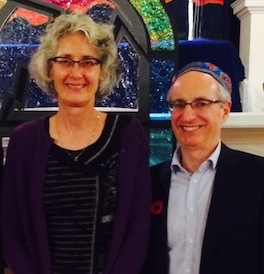When they were having their animated disagreements so many centuries ago, could the wise Jewish sages Hillel and Shammai have imagined how much we would still look to them today to help us navigate our fragmented world?
Mishna Avot, a third-century collection of teachings, reminds us that “any mahloket (disagreement) that is l’shem shamayim (for the sake of heaven) will continue to exist, but one that is not for the sake of heaven will not continue to exist. What is a disagreement that is for the sake of heaven? This is a disagreement of Hillel and Shammai.”
In our world that is both full of beauty and goodness and yet also permeated with divisiveness and polarization, Hillel and Shammai remind us that it was, and is, possible to hold opposing views while still respecting and learning from one another. A disagreement for the sake of heaven is one in which the parties are motivated by a genuine desire to seek the truth of the matter. There is no selfishness or lust for power. Rather, the disagreement is approached with humility, curiosity and a willingness to listen.
I recently completed an eight-week Mahloket Matters alumni fellowship through the North American branch of the Pardes Institute of Jewish Studies. I had previously studied at this pluralistic yeshivah (place of study) in Jerusalem, which is itself exemplary in demonstrating diversity, inclusiveness and a willingness to face challenging issues in respectful, cooperative and productive ways. What attracted me to applying for the fellowship was the topic – civil discourse. We would be delving into how to navigate difficult conversations and disagreements. When we all met, virtually, at the first class, we found that we shared a common concern about the fragmentation and jagged edges in our world, as well as a desire to learn and to equip ourselves with more skills to better navigate the types of thorny issues we face in our world.
Our studies were grounded in Jewish texts, which provided wonderful launch points for many of our discussions. We shared thoughts and ideas about what it means to have a disagreement l’shem shamayim and tried to bring those ideas forward to today. As Hillel and Shammai taught us, it is possible that sometimes both sides can be right and still hold opposing views. It’s also possible to debate an issue without harming relationships. Entrenched positions leave little room for genuinely listening to the other side or having the humility to admit that one might be wrong, qualities much needed for any truly healthy and productive disagreement.
U.S. Supreme Court Justices Ruth Bader Ginsburg and Antonin Scalia, may their memories be blessed, perhaps provide a more contemporary example of Hillel and Shammai. They were judges who held vastly different views on many issues and yet had a warm and lengthy friendship, never mind a shared love for opera, which they often indulged in together. In a statement that Bader Ginsburg released to the public on the death of Scalia in 2016, she said: “We disagreed now and then, but when I wrote for the Court and received a Scalia dissent, the opinion ultimately released was notably better than my initial circulation. Justice Scalia nailed all the weak spots – the ‘applesauce’ and ‘argle bargle’ – and gave me just what I needed to strengthen the majority opinion.”
Over the eight weeks of our studies, our diverse group from all over North America questioned, challenged, debated and confronted a multitude of issues, from moral foundations to creating our own mini Sanhedrin(Jewish High Court), taking on the role of judges and tackling some controversial issues from all angles. It was an enriching and meaningful experience, the fruits of which we are each now able to bring back to our own communities, with the hope that the small ripples we create through sharing our learning will radiate outwards and help, even in small ways. Help to smooth some of the sharp edges, soften rigid positions and create the safe spaces people need to have productive and healthy disagreements that create the fertile potential for new solutions to emerge – all for the sake of heaven.
Elisheva Gray is a lay leader and active member of the Victoria Jewish community and an alumna of the Pardes Institute of Jewish Studies.


